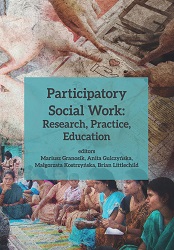Challenges Faced by Social Pedagogy Academics in the Course of Participatory Action Research with Homeless People and Street Workers as Co-Researchers
Challenges Faced by Social Pedagogy Academics in the Course of Participatory Action Research with Homeless People and Street Workers as Co-Researchers
Author(s): Mariusz Granosik, Anita Gulczyńska, Anna Jarkiewicz, Małgorzata Kostrzyńska
Subject(s): Higher Education , Methodology and research technology, Family and social welfare, Rural and urban sociology
Published by: Wydawnictwo Uniwersytetu Łódzkiego
Summary/Abstract: In taking the idea of participatory action research (PAR) seriously it seems necessary to change both power relation and epistemological perspectives. The basic research relation is perceived as bilateral, which means there are two or more subjects (sometimes collective) to be involved in- researcher and user/client- but most of interpretive research is focused on user perspective only. But there are more participants in the field who create social reality and produce interpretations “from the inside” (for example practitioners), and academic perspectives also plays their role in the process. So finally at least three viewpoints are needed to be recognized and scrutinized in participatory action research: academics, practitioners, and service users. Designing the research project titled: Onto-epistemologies of street social work with homeless people our initial idea was an interpretive assessment to be implemented in the field of such street working. We have realised that there are two quite different discourses (theoretical and practical) being developed during our meetings with practitioners, and no liaison work to be done. Homeless users’ perspectives being added a few months later made the reflexion more complicated. The main objective of this contribution is to share challenges that need to be faced by academics in the course of PAR co-produced with street workers and homeless service users. The focus is on the problem of defining homelessness, power negotiations, differences in conceptualisations of assessment, and the position of service users in the research. Because PAR is also recognised as a way to make the process of knowledge creation more democratic, some political dilemmas and limitations are being taken into consideration as well.
Book: Participatory Social Work: Research, Practice, Education
- Page Range: 253-274
- Page Count: 22
- Publication Year: 2019
- Language: English
- Content File-PDF

